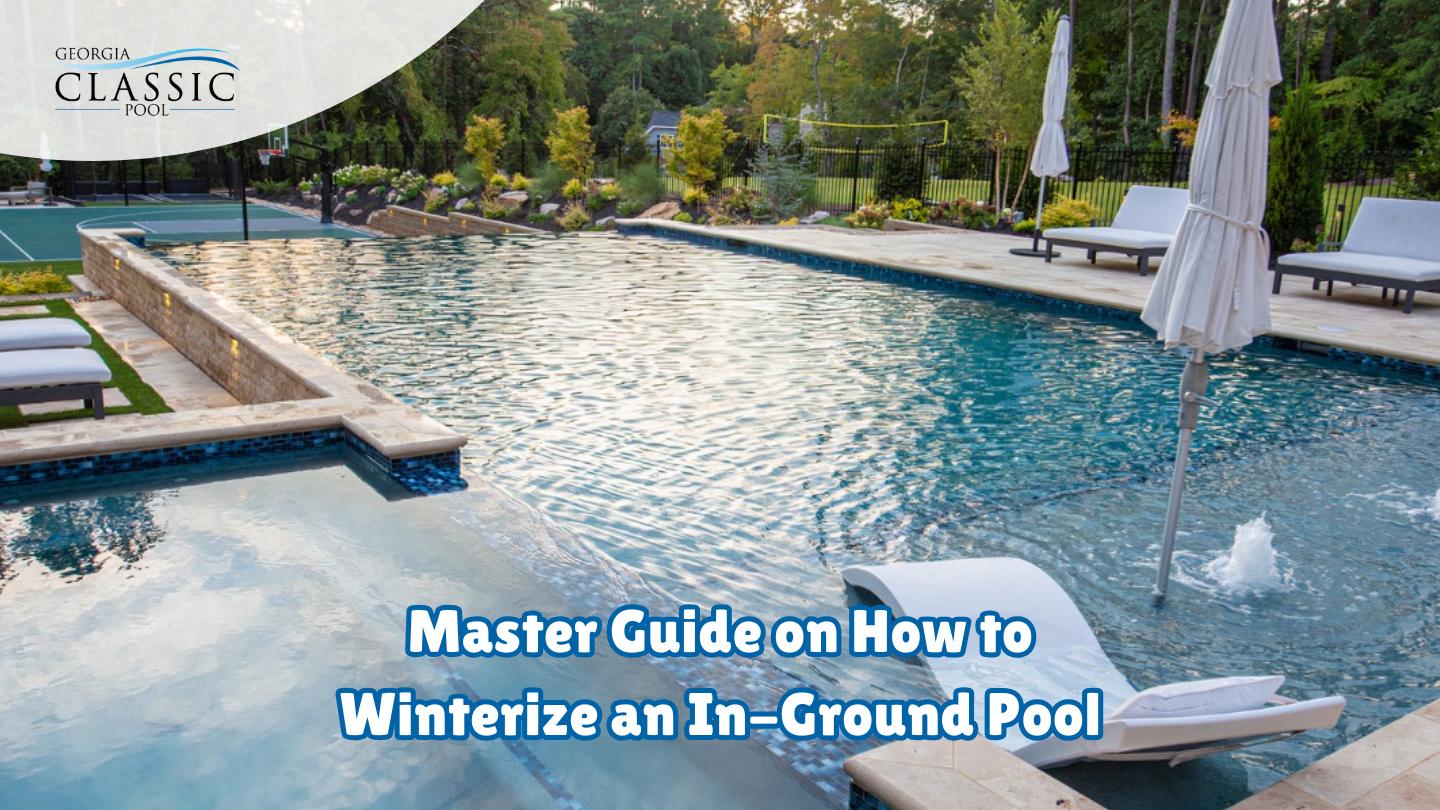Winterizing an in-ground pool is crucial to protect it from winter damage. Without proper steps, your pool can suffer from cracked pipes, broken equipment, and algae growth. This guide will show you how to winterize an in-ground pool step-by-step, ensuring it stays in excellent condition through the winter.
Key Takeaways
- Begin winterization when temperatures consistently drop below 65°F to prevent algae growth and equipment damage.
- Thoroughly clean and dry all pool accessories, balance water chemistry, and add appropriate winterizing chemicals before covering the pool.
- Properly drain and store pool equipment, secure the pool cover, and follow specific winterization steps for saltwater pools to prevent freezing damage.
Timing Your Pool Winterization
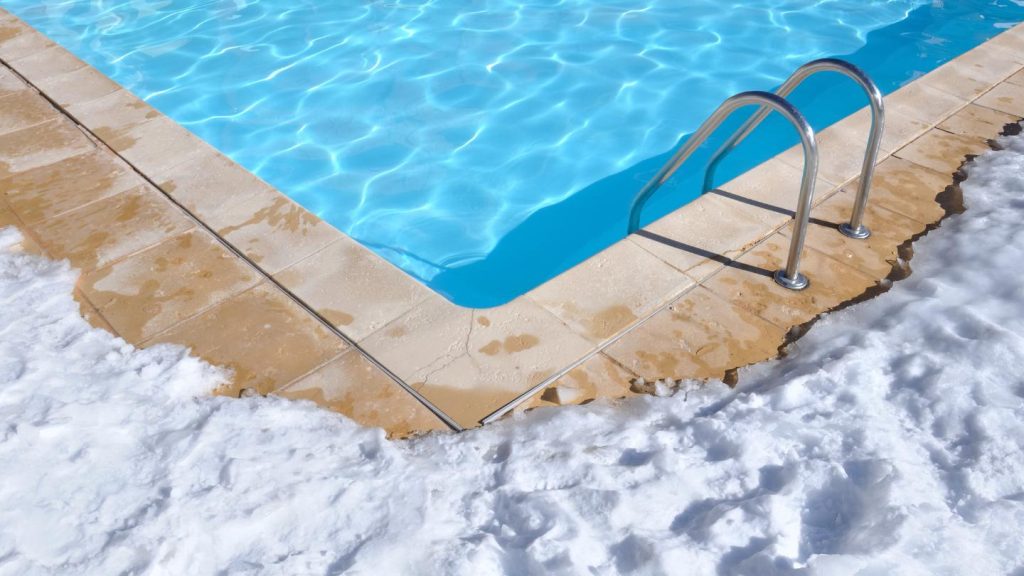
Timing is key when winterizing your pool. Begin once temperatures consistently drop below 65°F to prevent algae growth and potential damage to your equipment. Monitor the weather to ensure temperatures stay below this threshold before starting the winterization process.
Avoid starting too early, as warmer temperatures can cause algae issues. Conversely, waiting too long risks exposing your pool to freezing temperatures and potential damage.
As temperatures begin to drop, start preparing to protect your swimming pool from harsh winter conditions.
Preparing for Winterization
Before commencing the winterization of your pool, ensure you have all the necessary materials and tools at hand, such as a pool cover, an air compressor, skimmer baskets, and appropriate pool chemicals. While having tools like wrenches and screwdrivers may be helpful, professional services ensure every component is inspected and maintained with precision. Trained experts can address intricate pool systems and unique designs, reducing the risk of damage during the winter months.
Initiate the winterizing steps promptly as temperatures begin to drop to facilitate an efficient procedure. Comprehensive winterization extends beyond simply adding chemicals. Professionals assess your pool’s plumbing, filtration systems, and structural elements, ensuring your pool is thoroughly prepared for winter conditions.
Cleaning and Maintaining Pool Accessories
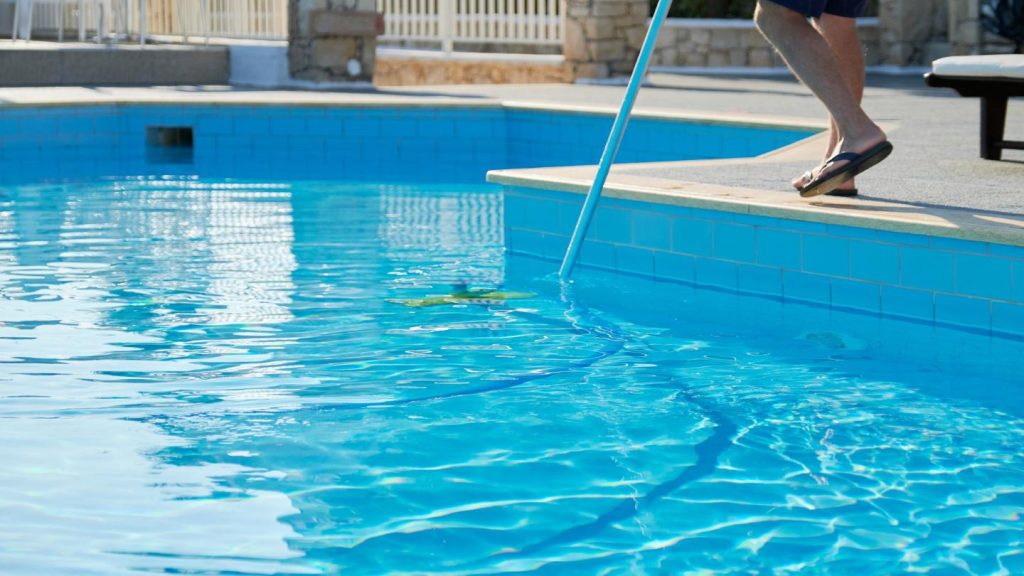
Begin the process of winterizing your pool by removing all accessories, including ladders, skimmer baskets, and toys. While it’s essential to clean and dry these components to prevent mold development, professionals take it a step further by thoroughly inspecting each accessory for wear and damage. This ensures that all components are safe and functional when reinstalled in the spring.
Rather than submerging components in homemade cleaning solutions, professionals utilize specialized tools and cleaning agents to prevent corrosion or damage. Proper cleaning and storage by experts eliminate the guesswork, preserving the longevity of your pool’s accessories.
Deep Clean Your Pool
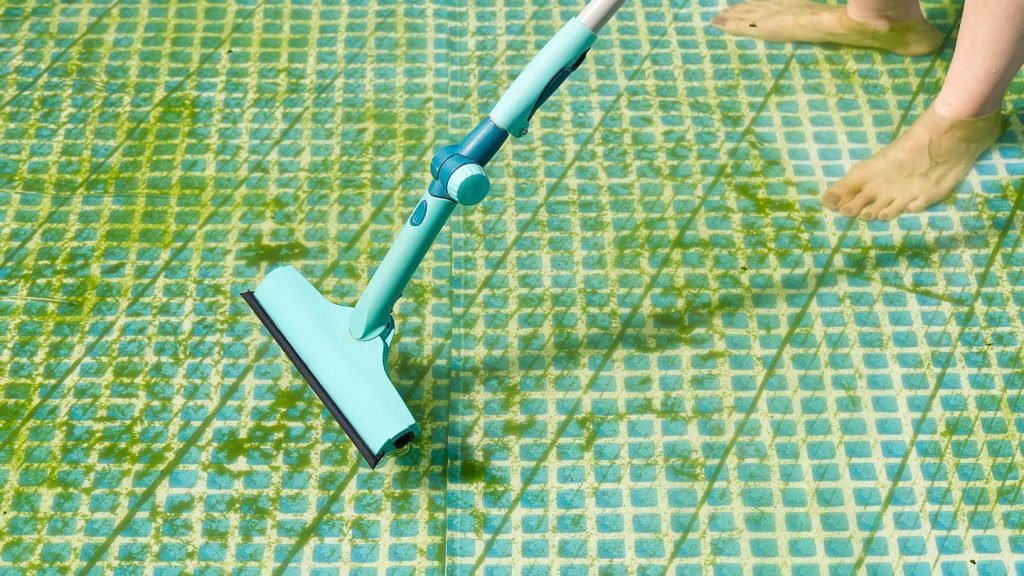
A deep clean is critical before winterization to prevent algae growth and maintain a clean pool throughout the off-season. While removing debris with a net and brushing pool walls is standard, professionals employ advanced techniques, such as high-efficiency pool vacuums and pressure washers, to ensure every corner is spotless. This level of cleaning reduces the likelihood of contaminants causing issues during the winter.
Experts also check for hidden algae behind ladders and accessories, ensuring a healthier pool environment. With professional cleaning, your pool is not only prepared for winter but also easier to reopen in the spring.
Balancing Water Chemistry
Balancing your pool’s water chemistry is vital to protect it during the winter months. Professionals analyze your pool’s pH, alkalinity, and calcium hardness levels with precision using advanced testing equipment. The ideal pH range is between 7.2 and 7.8, with alkalinity maintained between 80-120 ppm and calcium hardness between 200-400 ppm.
Rather than relying on DIY adjustments, professionals apply tailored chemical treatments to achieve the perfect balance. Their expertise ensures that your pool’s water remains stable, preventing damage to surfaces and equipment and making spring reopening seamless.
Adding Winterizing Chemicals
Applying winterizing chemicals is a critical step that requires careful measurement and distribution. While many suggest DIY methods for adding chlorine, algaecide, and shock treatments, professional services guarantee proper application tailored to your pool’s unique needs. Experts evenly distribute chemicals, ensuring full coverage to prevent algae growth, staining, and freezing damage.
Additionally, professionals use high-grade, industry-recommended winterizing kits to provide superior protection. They carefully follow chemical guidelines to maximize effectiveness, ensuring your pool stays clean and safe during the winter.
Lowering the Water Level
Lowering the water level helps protect your pool from freezing damage during the winter. Professionals expertly adjust your pool’s water level based on multiple factors. They assess your pool’s design, local climate conditions, and equipment type to determine the ideal water level.
By leveraging advanced draining tools, professionals ensure the process is efficient and safe for your pool’s plumbing and structure. This expert approach minimizes the risk of freezing or other damage.
Draining and Storing Pool Equipment
Properly draining and storing pool equipment is essential to prevent freezing damage. While DIY methods suggest disconnecting plumbing unions or removing drain plugs, professionals follow a meticulous process to safeguard every component. They thoroughly dry and inspect the pump, filter, and heater for damage or blockages.
Experts also store delicate equipment, such as pressure gauges and multi-port valves, in climate-controlled environments to protect them from harsh weather. By adding pool antifreeze to plumbing lines, professionals ensure maximum protection against freezing temperatures, extending the life of your equipment.
Winterizing Pool Plumbing
Protecting your pool’s plumbing from freezing requires specialized expertise. Rather than using DIY air blowers, professionals utilize high-volume, low-pressure equipment designed for efficient water removal. They inspect all skimmers and main drains, ensuring water is expelled completely to prevent ice-related damage.
Additionally, professionals apply the exact amount of antifreeze required for your plumbing system, sealing pipes with precision to prevent leaks. This ensures that when the swimming season returns, your pool’s plumbing system remains in perfect condition and ready for use.
Securing the Pool Cover
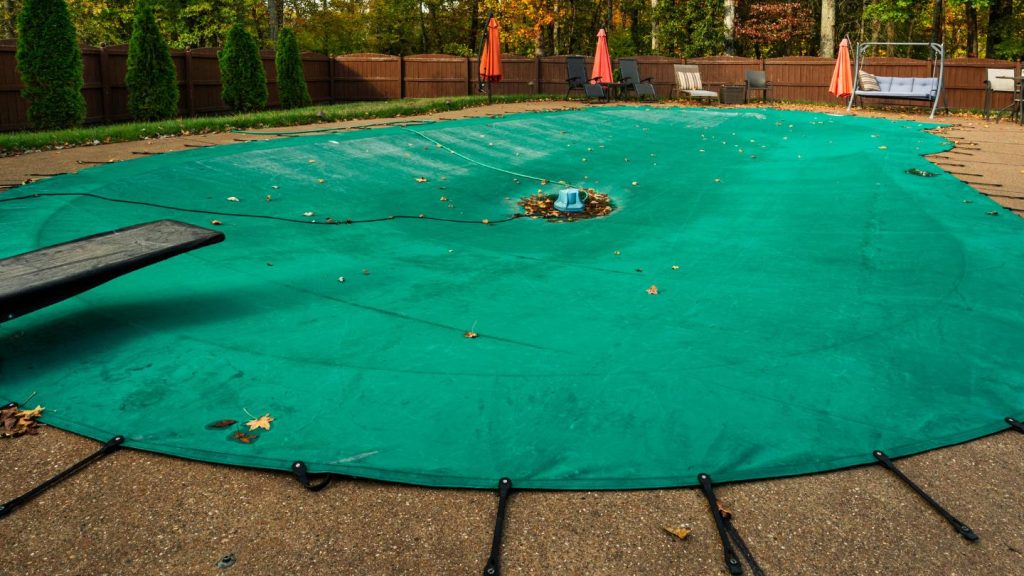
Securing a pool cover is essential to protect your pool from debris and harsh weather during the winter. While DIY methods suggest using cover clips and sandbags, professional services provide a more secure and tailored solution. Experts ensure your pool cover is properly fitted, inspecting for tears or weaknesses that could compromise its effectiveness.
For added protection, professionals may use air pillows to distribute weight evenly and prevent ice accumulation. Regular inspections and adjustments by experts throughout the winter ensure the cover remains intact, maintaining your pool’s cleanliness and reducing the risk of damage.
Special Considerations for Saltwater Pools
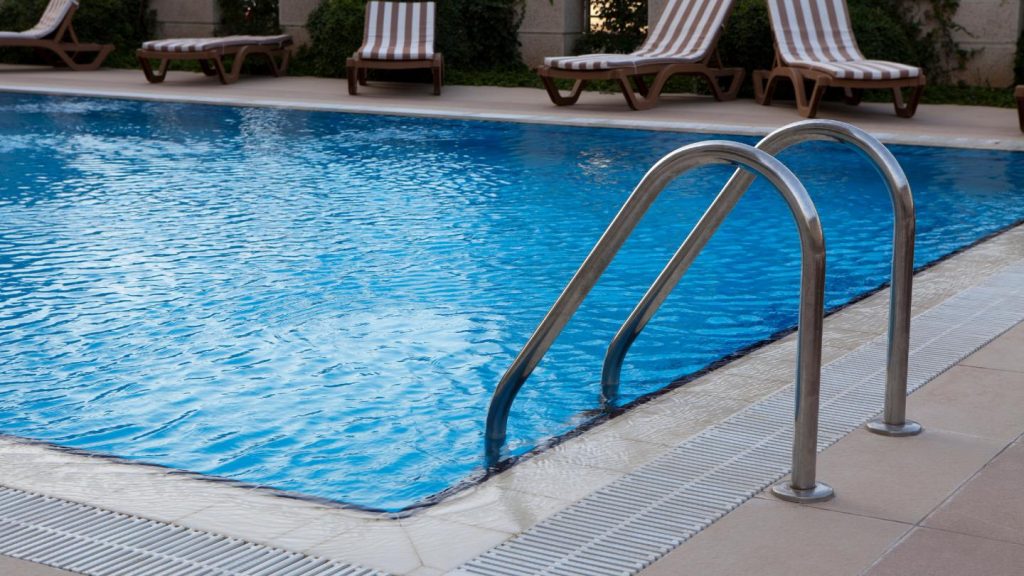
Saltwater pools require additional care due to their unique features. Professionals adjust salt levels to maintain the system balance and prevent freezing damage. They also inspect and clean the salt cell with specialized tools, ensuring optimal performance.
Experts carefully winterize components like saltwater chlorinators, skimmers, and plumbing systems to prevent freezing damage. Their attention to these unique requirements ensures your saltwater pool remains in excellent condition, even in colder temperatures.
Summary
In summary, executing the proper winterization steps is crucial for protecting your in-ground pool from winter damage and ensuring a seamless reopening in the spring. Each component, from thorough cleaning and precise water chemistry balancing to securing the pool cover and winterizing plumbing systems, plays an integral role in maintaining your pool’s integrity.
At Georgia Classic Pool, we are experts in designing custom swimming pools for Atlanta, and we offer professional winterization services tailored specifically to your pool’s requirements. Reach out to us today to schedule your winterization and keep your pool in top-notch condition throughout the colder months. Let us help you create the backyard oasis of your dreams.
Frequently Asked Questions
Can I use a standard pool cover to winterize my pool?
No, a specialized winter pool cover is recommended as it provides better protection against debris, weather damage, and algae growth during the colder months.
What happens if I don’t lower the water level during winterization?
Failing to lower the water level can lead to freezing in the skimmer and plumbing lines, which may cause cracks and expensive damage.
Is it necessary to winterize a saltwater pool differently than a chlorine pool?
Yes, saltwater pools require additional steps, such as adjusting salt levels and properly cleaning the salt cell, to prevent freezing and ensure the system remains balanced.

